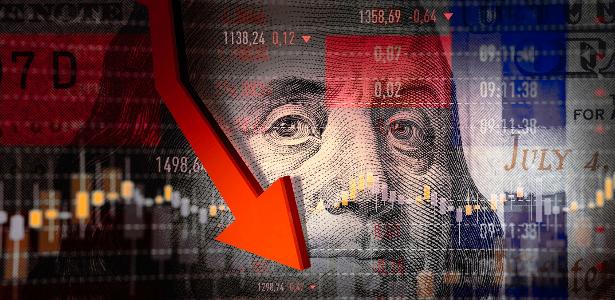
The move added to investor concerns about a possible recession in the United States.These pessimistic sentiments were exacerbated by the jobs report released last Friday, the second, which showed Unexpected Slowdown in Hiring in July.
A recession, by definition, is a decline in a country's economic activity. Since 1974, an economy has been considered in recession when there are two consecutive quarters of decline in gross domestic product (GDP), the total value of goods and services produced in a country during a given period, compared to the previous quarter.
Economic recession involves different situations. These include a decline in the level of economic activity, increased unemployment, lower consumption and investment indicators, lower household income and lower total society income, which includes people's wages and corporate profits – and this decline can lead to lower profits and an increased risk of bankruptcy.
There is also the concept of artistic stagnation. In this case, the economy must show a decline for three consecutive quarters, or nine months, in order to be considered in a technical recession.
It's an economic warning sign. The most worrying scenario occurs when this economic downturn continues for a long time, affecting several sectors.
It can have several causes. Causes of recession can include poorly planned or poorly implemented economic policies, as well as external shocks that cause a sudden decline in production, consumption, and investment.
The economic downturn affects several social and economic aspects. It can lead to increased poverty and deterioration of health, education and housing services.
The recession affects people's lives because we have fewer jobs, more people living in precarious situations, less purchasing power and therefore less well-being.
Juliana Inhas, Professor and Coordinator of the Undergraduate Course in Economics at Insper
The US economy remains strong. The U.S. economy grew more than expected in the last quarter, driven mainly by consumer spending, which accounts for more than two-thirds of the country’s gross domestic product. The U.S. services sector activity index rose to 51.4 in July from 48.8 in June, compared with analysts’ expectations for an increase to 51.
There is no recession yet. Although there are signs that the US economy is slowing down, this does not necessarily mean a recession. It is a warning that a recession is possible in the future, but it has not yet become a reality, explains Carla Penny, an economist and MBA professor at FGV.

“Friendly zombie guru. Avid pop culture scholar. Freelance travel geek. Wannabe troublemaker. Coffee specialist.”






